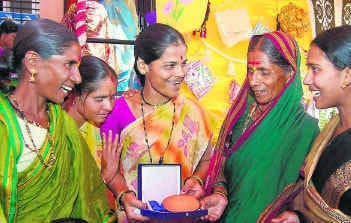Rural B-School Empowers Women in India!
In 1990, I went to Insitute of Rural Management, Anand.
It was and remains one of the premier Business School that caters to Rural Management specifically. It was started with a dream that since Indian MBA students need to understand villages as much as the corporate intricacies! Well, we did learn a lot about rural life. Yet it was an elitist institution of sorts.
THAT was revolutionary in terms of business school education.
Now, a lady called Chetna Gala Sinha has taken that concept to its logical conclusion – an MBA school for the rural poor – Mann Deshi Udyogini Business school ! The students are semi-literate who need education in business subjects to start using funds loaned via the micro-finance lenders. This school – for rural women – also helps in spreading empowerment to women.
Sagar of “Development through enterprise” introduces Mann Deshi Udyogini Business school thus:
MDU was started in December 2006 by the Mann Deshi Mahila Sahakari Bank (MDMSB), which is a co-operative society providing micro-credit to rural women entrepreneurs in Satara district of Maharashtra state in India. Chetna Gala Sinha, the founder-chairperson of MDU, is an Ashoka fellow and she started the MDMSB in 1998 in order to cater to the credit needs of rural women. According to Chetna, the idea of starting a business school came from an enthusiastic semi-literate woman, who kept pestering her for know-how about the wholesale vegetable business and other startegies to improve her own vegetable business. MDU was started in December 2006 with a Rs. 7 lakh (about $17500) grant from HSBC.
This school has helped women in villages where erratic rainfall and weather has reduced agriculture production and the men have migrated to cities to earn. These women have stayed back and taken courses from this school to help themselves and their families.
Gala noticed that the poor women were not only repaying their microloans, they were also saving 1.5 cents to 60 cents a week from their daily wages, which typically range from 75 cents to $2. With no institutional saving products available, the women, who worked as daily laborers or vegetable vendors, put the surplus money in tin boxes they quietly buried in the sand around their dwellings to shield them from avaricious or drunken husbands. Or the women deposited their savings with the neighborhood grocer, who often cheated them, according to Sakhubai Lokhande, who weaves thread for brooms.
Today the school offers 19 skill-development courses, including computer training, bag making, English-language training, and financial literacy instruction. A free counseling session helps tap the interest and possible skill sets of the women; they are then encouraged to take the requisite course. Course lengths vary from just a day to 10 days, and schedules are often adjusted to suit the women. The fees range from 2.5 cents a day for a basic finance course to $2.50 for 10 days of computer training or advanced finance, and diplomas are awarded after completion.
This business school works well with the micro-finance enterprise that Ms. Sinha ran earlier. The school is looking at partnering with different entities to further enhance its value to the students.
Technorati : Mann Deshi Udyogini Business school, microfinance




